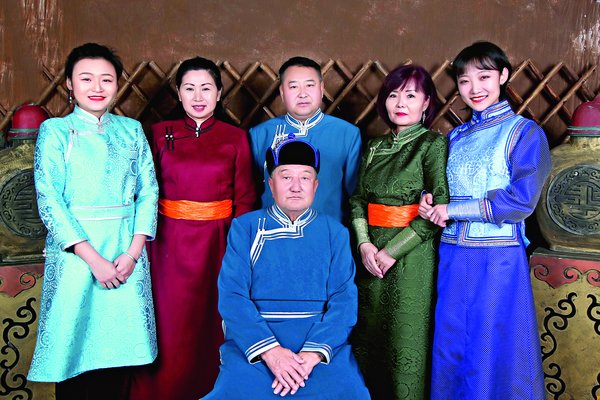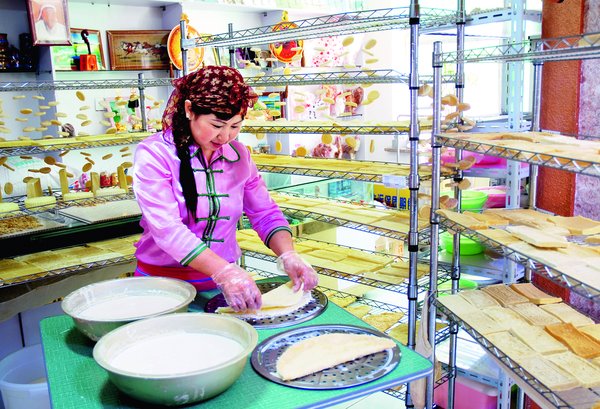Milk Flavor from Grassland
 |
| Huala's family poses for a photo. |
In Horqin Right Wing Middle Banner, located in Hinggan League of North China's Inner Mongolia Autonomous Region, many of the local residents are likely to mention a woman, whose name in Mongolian is Huala, when they talk about milk products. Huala's family supports her in her efforts to manage a milk-products company. The residents of the banner appreciate Huala and her family for their commitment to inheriting the traditional methods for cooking and processing milk products. The residents also appreciate the family's efforts to advance tourism development in the region.
The milk products are something one must not miss when he or she is visiting Inner Mongolia Autonomous Region. While sitting in a Mongolian yurt, one should not miss the opportunity to drink a bowl of hot milk tea, or to sample the local snacks made from milk. The milk flavor from the grassland becomes an unforgettable memory of anyone who has been to Inner Mongolia.
Dream from Childhood
People living in Horqin Right Wing Middle Banner are familiar with the story of Huala. She is a herdswoman from an ordinary family in the banner. She is also the founder of a milk-products company.
Through her years of hard work, Huala has made her brand, "Batu Chagan," known by more and more people. She does her best to pass the traditional cooking methods and milk-processing techniques to younger generations. She hopes to help women in her hometown create wealth and live better lives.
Huala was born on a beautiful grassland. Handmade milk products left an impression on her as a child. The months of August, September and October, on the Chinese lunar calendar, make up the best season to make milk products. Fresh milk is poured into a pot and heated slowly over a fire. The layer of crème, floating on the surface of the milk, can be separated and then dried to make a traditional milk snack, naipizi (奶皮子).
 |
| Huala makes a traditional milk snack, naipizi. |
"I learned how to milk cows and cook milk products from my mother when I was a little girl. I dreamed of one day opening my own company to make milk products. I wanted to let the milk flavor from my hometown be known by more and more people," Huala recalls.
Huala began to fulfill her dream in 2012, when she used money she had borrowed to open a 60-square-meter store. To improve the quality of milk products, Huala strictly ensured the milk she used was both pure and fresh. She did not add any preservatives or additives to the milk products.
Gradually, Huala developed a dozen products, such as milk curd and crème- and butter-made snacks. The pure, fresh taste of Huala's milk products attracted more and more customers. Two years later, Huala was able to expand her factory to 500 square meters.
Huala inevitably encountered hardships. Regardless of the various difficulties, though, she held firm to her belief: "No matter how much money I earn from my business, I must pass on the traditional cooking and processing techniques of milk products from my hometown. I want to make our milk products popular. Thus, I can help women from my hometown escape poverty, and they can make contributions to the construction of our hometown."
Huala's efforts have paid off. The "Batu Chagan" milk products made by her company have won several awards during contests for famous Chinese snacks or famous snacks from Inner Mongolia. Huala has been named an outstanding woman in inheriting traditional milk-products-making skills, and in creating wealth and promoting tourism development of her hometown.
Thinking of Women
Huala has received several awards as a result of the achievements she has made in running her business, and in inheriting traditional milk-product-making skills. She has also explored possible measures to help lift impoverished households in her hometown, especially women from poor families, out of poverty. For example, Huala has employed women, who have grasped milk-product-making skills, in her factory. That means the women do not have to leave their hometown to find a job and earn a living. Huala helps them sell their milk-based products.
"During the busiest production season, I once hired 30-plus people. Ten of them were from impoverished households. Siqingerile was one of them. Her husband was disabled, due to a car accident. She had to earn a living for her three-member family. She told me she had considered leaving home to find a job, but she worried about her husband and child. After she heard my company was recruiting workers, she was the first to apply for a job. She said I offered a perfect choice for her — earning money in her hometown, on the one hand, and looking after her family, on the other hand," Huala explains.
She encourages her employees to lend a helping hand to people in need. They sometimes visit elderly people who live alone, and take clothes and milk products to them.
In addition to making milk products, Huala is also interested in developing tourism and craft-related projects, such as handmade embroideries featuring folk-art designs. When talking about the future, Huala says she hopes tourism in her hometown will develop faster, so there will be more visitors coming to see the beautiful grassland, on which she has grown up. She wants to expand her factory, so she can help more women find jobs and increase their incomes. She invites master crafts-makers to teach women in her hometown craft-making skills, so the women can explore new ways to create wealth.
Huala's family always supports her in her management of the milk-products company. Nine of her siblings actually work in the company, to help her advance the business. Huala's son, Kunpeng, is responsible for exploring innovative modes to continuously develop his mother's business.
During a livestreaming program, Kunpeng recalled: "When I was a little boy, I saw my father cooking milk tea at home. My mother separated the layer of crème floating on the surface of the boiled milk. I still remember clearly the smell of the crème." He added he hopes the sweet smell of the crème, which represents an important part of his memories about hometown, will be smelled and loved by more and more people.
As a recipient of the National Most Beautiful Family award, Huala's family, which seems to be an ordinary family from the grassland, has made extraordinary achievements in inheriting traditional milk-product-making skills, and in promoting the culture and tourism of their hometown.
Photos Supplied by Huala
(Women of China English Monthly March 2021 issue)
Please understand that womenofchina.cn,a non-profit, information-communication website, cannot reach every writer before using articles and images. For copyright issues, please contact us by emailing: website@womenofchina.cn. The articles published and opinions expressed on this website represent the opinions of writers and are not necessarily shared by womenofchina.cn.






.jpg)

 WeChat
WeChat Weibo
Weibo 京公网安备 11010102004314号
京公网安备 11010102004314号